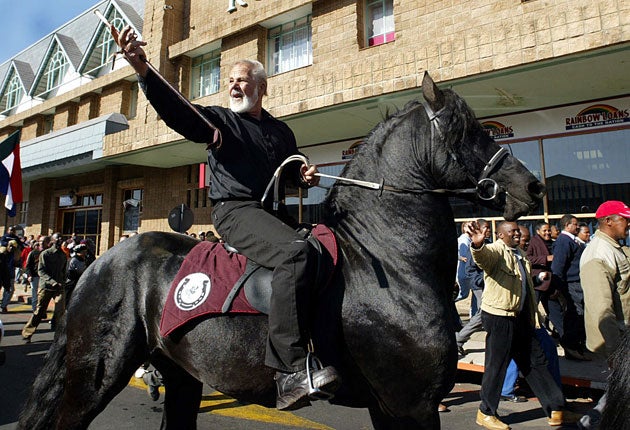South Africa's Terreblanche hacked to death
Neo-Nazi leader who fought for all-white state – and was convicted of trying to kill black employee – is murdered by farm workers

Your support helps us to tell the story
From reproductive rights to climate change to Big Tech, The Independent is on the ground when the story is developing. Whether it's investigating the financials of Elon Musk's pro-Trump PAC or producing our latest documentary, 'The A Word', which shines a light on the American women fighting for reproductive rights, we know how important it is to parse out the facts from the messaging.
At such a critical moment in US history, we need reporters on the ground. Your donation allows us to keep sending journalists to speak to both sides of the story.
The Independent is trusted by Americans across the entire political spectrum. And unlike many other quality news outlets, we choose not to lock Americans out of our reporting and analysis with paywalls. We believe quality journalism should be available to everyone, paid for by those who can afford it.
Your support makes all the difference.South African neo-Nazi leader Eugene Terreblanche has been hacked to death in his sleep by two workers on his farm after what was believed to be a dispute over unpaid wages.
Police arrived at the farm in Ventersdorp in the western Transvaal at 5pm yesterday and found Terreblanche, 69, on his bed with serious wounds to his head and body. They also found a knobkerrie and a panga – a machete used for chopping vegetation – abandoned nearby.
Terreblanche died in hospital two hours later, South African media reported. Andre Visagie of the Afrikaner Weerstandsbeweging, or Afrikaner Resistance Movement (AWB), told the website News24 that Terreblanche had been so badly beaten "he did not look like Eugene any more".
Police captain Adele Myburgh said a 16-year-old youth and a 21-year-old man who worked on the farm had been arrested and charged with murder. She said they had told officers there had been a dispute because they had not been paid.
Despite a revival within his party over the past two years, Terreblanche had lived in relative obscurity following his release from jail in 2004 after serving a six-year sentence for the attempted murder in 1996 of a poor black labourer employed on his farm. He left Paul Motshabi brain-damaged and crippled after beating him with a blunt instrument, allegedly for taking a break without permission, and at the same trial was convicted of setting his dog on a petrol station attendant.
His death comes as rising concerns over increasing racial polarisation in South Africa have been sharpened by an incident in which the head of the ruling ANC's youth league sang a song with the lyrics "Kill the Boer".
A former policeman, Eugene Terreblanche and six others founded the AWB in 1972 in response to what he saw as increasingly liberal policies from the South African government which he feared would lead to the end of apartheid.
Fighting for an all-white state in which black people would be permitted only as guest workers, for more than 20 years he trod a fine line between politics and terrorism. He became increasingly high-profile, arriving on horseback at the head of rallies of his uniformed paramilitaries, flanked by masked bodyguards dressed in khaki or black. His supporters brandished guns, police batons and knives. But despite his outward menace, his overblown rhetoric lacked coherence and he once fell off his horse at one of his own parades. He was mercilessly exposed by the British filmmaker Nick Broomfield in his 1991 documentary The Leader, His Driver and the Driver's Wife, followed in 2006 by His Big White Self.
In January 1989, Terreblanche faced a revolt within the AWB after he was found in the grounds of an Afrikaner monument late at night in the company of journalist and former model Jani Allan. They denied a romance, but several supporters angry over allegations of womanising and drinking urged Terreblanche to quit. He refused.
Terreblanche threatened to take the country by force if the white government capitulated to the African National Congress, but after the ANC won an overwhelming mandate in the 1994 elections, his party almost disappeared.
In 1998, Terreblanche accepted "political and moral responsibility" before South Africa's Truth and Reconciliation Commission for a bombing campaign, to disrupt the 1994 elections, in which 21 people were killed.
Join our commenting forum
Join thought-provoking conversations, follow other Independent readers and see their replies
Comments